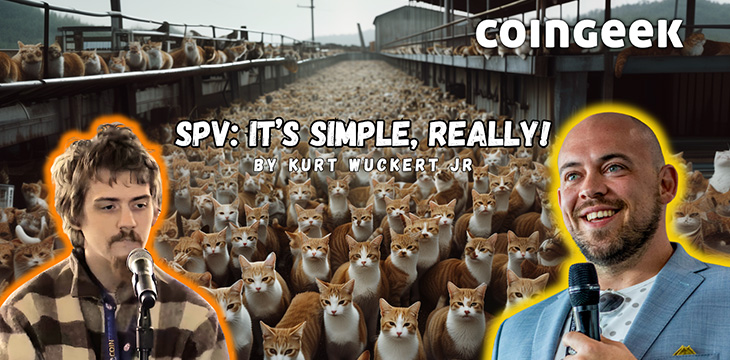
|
Getting your Trinity Audio player ready... |
I want to be upfront about this. This article is going to put off a lot of readers.
It isn’t fun to read something that challenges your established mindsets as it is to read something which reinforces them.
This post will be ‘hard to swallow medicine’ for most readers, speaking as one who has taken the medicine myself. And having seen the extent of what the path we are on inevitably leads, I cannot go back to the blissful ignorance of my previous existence. I cannot unsee what I have seen.

Posit:
You don’t want to be anonymous. You really don’t. You may think you do because you have been programmed to believe so, but you really don’t. It’s the nuclear bomb of online behavior; you don’t use it unless there is no other option, and to do so at scale will cause the destruction of society just as utterly. —Me, now.
Let’s get the initial de-programming groundwork out of the way:
Privacy is not the same as anonymity. Not even close. Privacy means keeping information that isn’t anyone else’s business out of reach to anyone it shouldn’t concern. It means that if you want to buy/sell/trade/engage with someone, then the people who should have access to that information are the people or parties involved. It means confidentiality and the right to it.
This means, more generally, keeping confidential information away from the public.
On the other hand, anonymity is a word whose meaning has been twisted by special interests to mean something synonymous with privacy. That is no coincidence. They want everyone to think that it is the same, just like They in John Carpenter’s cult flick wanted all humans to stay asleep and unaware of their presence.
Anonymity means to be unknown by anyone. There are no identities. Therefore, nobody knows who anyone really is.
This difference is the key to everything. It is what removes any accountability from online behavior. This small detail is what separates a dystopia from a utopia.
Nobody really needs anonymity for anything outside of publishing politically suppressed speech. While the ability to express your thoughts with an unknown identity may be allowable depending on the platform, and in some cases even necessary, there is no legitimate use of anonymity in anything which involves another party directly—namely, trade or exchanges.
This is because there needs to be accountability to ensure that if one side is aggrieved, there need to be ways in which the victims can find justice.
The mainstream cypherpunk culture has successfully brainwashed the public into thinking that to protect our personal privacy, we need to demand anonymity for everyone. It promotes the notion of anonymity to mean private. Both are false.
Using protonmail isn’t being anonymous.
Using random accounts on Twitter isn’t being anonymous.
Using pseudonyms on Facebook (NASDAQ: META) isn’t being anonymous.
All the above are pretty good ways to protect your privacy. BUT they are all traceable by the right authorities with subpoenas and reason to suspect you of doing something criminal. Additionally, being pseudonymous is not the same as being anonymous.
Most authors that publish under pseudonyms are the classic example. There ARE people who know who the real person is. It’s just not public information.
To be truly anon, you must actively erase all traceability for your online activity. You must be using TOR for all web access and also PGP encrypting all your email. You must be keeping high levels of opsec, careful never to connect your true identity to your alter-ego. You must be living completely separate online lives from your real-world one. One that you need to keep secret, likely because it involves doing something illegal. Hackers are the classic case for anonymity.
There are few truly anonymous people in common knowledge, although there is no shortage of people who think they are anonymous and continually lobby for it.
The infamous dark market of Silk Road’s operator Dread Pirate Roberts was anonymous. As was AlphaBay’s Alpha021. As are the entities behind criminal hacking groups. But you, the average netizen and justice warrior, likely are not.
If you use Twitter, Facebook, or Instagram at all, you aren’t anon. You are just an unpaid advocacy activist for your true anon masters. Twitter is traceable, and unless you are using Twitter through TOR, you aren’t anonymous. Most personalities that people think of as anonymous aren’t really anonymous but pseudonymous. Good examples are Bitcoin’s Satoshi Nakamoto and the artist ‘Banksy.’ They aren’t truly anonymous because there are people in real life that know who they are. It just isn’t publicly known. It’s a confidential identity. Being truly anonymous means, you have no identity; there is no connection from the persona to a real person.
Thus, using anonymity as a solution for privacy or confidentiality is like getting rid of your cockroach problem with a Boring Company Not-A-FlamethrowerTM. Sure, it may get the job done, but it also burns down your house. All while the real pyromaniac criminals who don’t care about your cockroach problem or your house cheer you on, so long as it distracts onlookers more interested in watching your house burn down than noticing the depraved crimes that they are committing in the shadows of the alleyway across the street.
Now, before we get too far on with this, I’d like to address the one exception to the “you don’t need anonymity” posit. This is the case if you live in an oppressive political regime, and the use of public internet is banned or punishable by law. In such a climate, there is justification for using anonymizing tools to avoid persecution. But the use of these tools are not predicated on the need for anyone else to have to use them as well. That is to say, if you are a political dissident in North Korea, you can still effectively use these tools even if nobody else does. This does cause a bit of a quandary, though, in that, because some people in the world may need to use the tools, they need to be made available to all, including those who will use them nefariously. That trade-off is unavoidable, but there is something that we can do—stop aggrandizing its use. It should be seen as something that is used akin to an SOS signal at sea. You don’t go about sending out a signal for help unless you really need it. And this is the point that the real anon criminals would like to blur; they want people to use anonymizing tools just as they would use their toasters as a part of daily life, as it shrouds and hides their illegal uses of it, much like the act of laundering money involves washing dirty money with the clean. There can be no effective illicit users of anonymity without enough legal users to ‘cover’ for them. They need you out there in order to hide in the crowd.
We can’t go back
The internet has changed the way society is put together. These days we have social media instead of news media. Like the world after the Guttenberg press, we cannot go back to how it was before. The internet has brought wonderful things to society. It has allowed us to be more connected than ever before, allowing our ideas to flow across the world in ways never before thought possible in human history. With this near-instantaneous flow of information, the ‘collective consciousness’ was born, and we act more like a single (though certainly schizophrenic) entity than billions of individuals. It is, therefore, now our duty to ensure that we act morally, for the collective consciousness is no good without a collective conscience.
While this technology has amplified all the positive, creative energy of society, it has equally amplified the negative evil depravities that lurk in each human soul. This post started off as a book review of Andy Greenberg’s Tracers in the Dark, which opened my eyes to how widespread the evils unleashed with the advent of what was thought of as an ‘anonymous’ cryptocurrency, Bitcoin2, were. In it, Greenberg tells the cat-and-mouse story of law enforcement in pursuit of criminals using cryptocurrency to expand global multibillion-dollar empires, starting with the Silk Road and ending with the child exploitation markets, which were taken down using bitcoin tracing techniques. While the author tries to portray a balanced, nuanced view of the pros and cons of anonymity, he did fail to point out one major omission: that many of these crimes wouldn’t have existed in the first place if there wasn’t a way for criminals to transact with each other anonymously3 online. It was the (false) promise of anonymity that allowed thousands of children to be kidnapped and sold to slavery so that exploitative videos could be sold. “Anonymity” was the enabler, with the promise of anonymous cash payments. So even though Bitcoin eventually provided it with the means by which the criminals were eventually caught, if it didn’t exist in the first place, the scope and extent of these crimes would not have been to the shocking levels that they became. So just as with the invention of the rifle and all the good it enabled, it also enabled plenty of evil.
As any good gun owner can tell you, the difference is in our own mentality. The tool just amplifies and reflects our own moralities and vices.
The same old game, by a different name
Remember when it was okay to publish whatever you liked? And sell whatever you want? — At the turn of the century, we had the age of snake oil, elixirs of vitality, and companies extolling the virtues of radioactive radium toothpaste (and, along with them, the unfortunate people who lost their teeth and jawbones using it). Generations later, we can all agree that we need some form of industry watchdogs to keep marketers accountable for what they are peddling. These days, you can’t sell something that can actually harm people4, thankfully.
But now society is on the other side of the cycle, where it seems the watchdogs and authorities may be abusing their influence to increase their own power and control, ready to sell their services to the highest bidder. These days, people are more concerned about the abuse of power and corruption in our established institutions. It is on this sentiment that the anonymity peddlers have sprung their brainwashing campaign, taking advantage of the distrust of authority, which is the zeitgeist, in order to turn everyone into an unknowing lobbyist for their selfish cause. Don’t let them succeed. Ensure you understand that the fight for privacy has nothing to do with anonymity.
Bitcoin has opened up pandora’s box of online payments. The technology has evolved, and now the criminals have the advantage in the ongoing cat-and-mouse game with privacy coins such as ZCash and Monero. The eternal chase continues while innocent victims are harvested, and others become online apologists for those tools, ignoring those who use them for evil, shrugging it off as an unfortunate side-effect. We can’t turn back the clock, so we must ensure that with online presence and payments comes privacy, but also the ability for traceability, in order to ensure that corruption and anti-social uses can be rooted out, whichever side of the pendulum it happens to show up on.
/TheWallStreetTechnologist
NOTES:
[1] Both where were eventually unmasked by the tireless work of law enforcement.
[2] Thankfully, bitcoin is anything but anonymous, quite the opposite actually, which allowed law enforcement to catch many of the criminals who used it.
[3] [ibid] bitcoin wasn’t anonymous, though.
[4] Though unfortunately, you can still sell something that doesn’t do as you said it would. However, consumer fraud laws do protect buyers from outright false marketing. Still, plenty of miracle diet supplements still exist. Thankfully none will make all your teeth and jaw fall out! (Radium toothpaste was totally a real thing)
Watch: The Bitcoin Masterclasses: Identity & Privacy

 11-22-2024
11-22-2024


